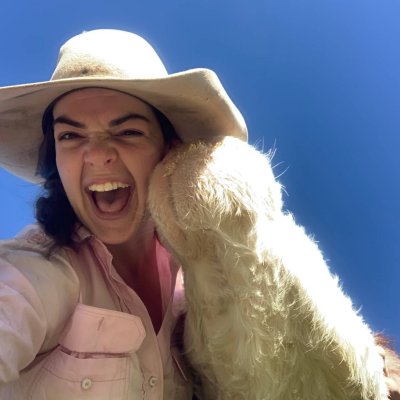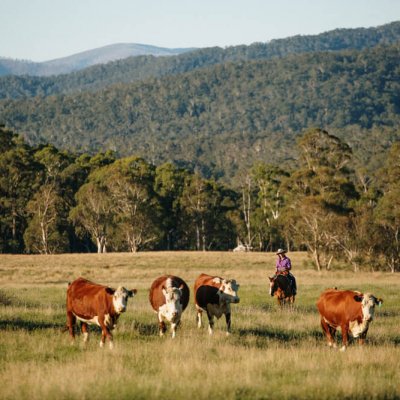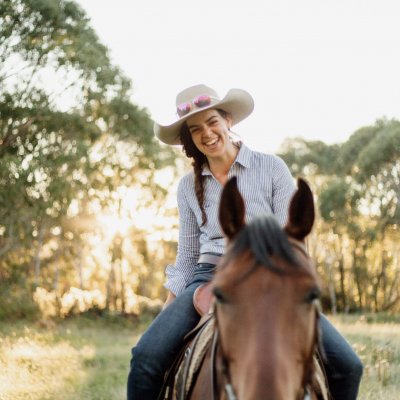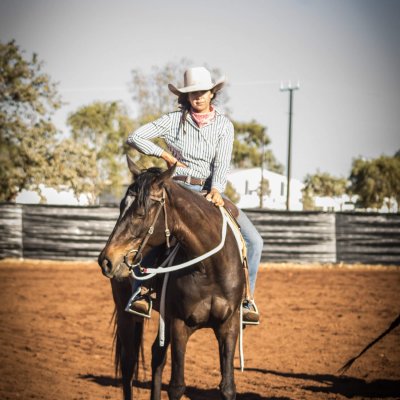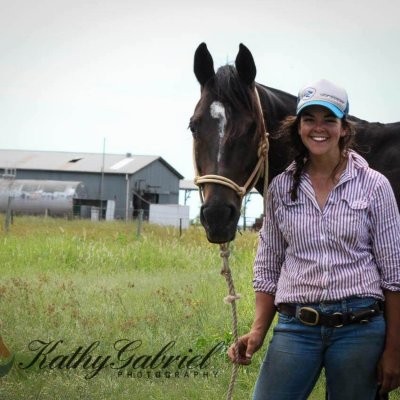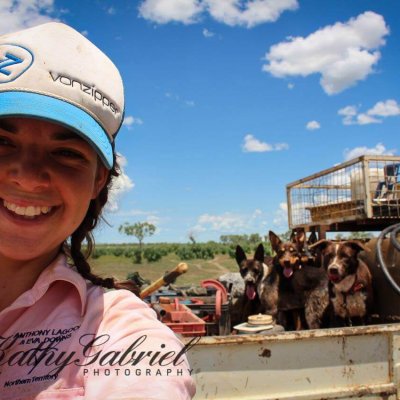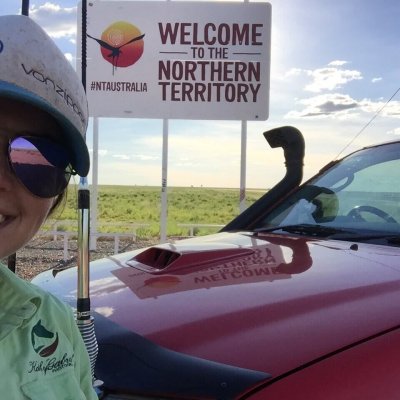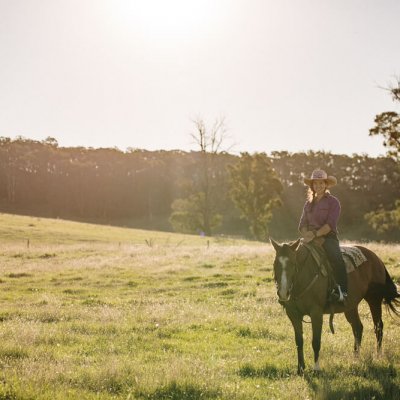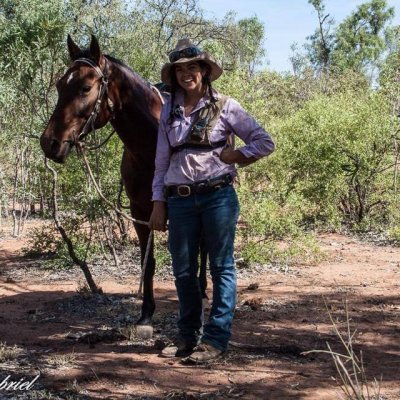At just 21, Kathy Gabriel became a face of rural Australia via her popular Facebook page Experience Australian Agriculture (now Kathy Gabriel), where she shared stories, photos and videos of her self-imposed one-year challenge to work in as many rural industries as possible. Determined, passionate and an adventurist, Kathy grew up on a hobby farm in Yea in Central Victoria, where she developed a love of animals – especially horses – from a young age. In her late teens, she travelled across Victoria, South Australia, New South Wales, Queensland and the Northern Territory, lending a capable hand to everything from farms to sheep and cattle stations, racing stables to contract mustering. Today, she is the proud manager of a 1000hA Hereford beef property, in addition to managing her own property near Benambra in the Victorian high country. Kathy loves the freedom of being her own boss, is a talented photographer and blogger and is an inspiration to those around her. In 2018, she competed in Mongolia’s Mongol Derby – a 1,000km semi-wild horse race which is commonly known as the longest and toughest horse race in the world.
When asked what concerned her about the health, safety and wellbeing of those in rural industries and communities, Kathy said that a leader’s reaction to when things don’t go to plan – “when people start to rush, take shortcuts or when anger becomes their primary emotion”– can have serious consequences. She stressed the importance of regulating your emotions, managing your time wisely and making allowances for the unexpected. When it comes to employees, she also reinforced the value in fostering a happy workforce. “If people are content, they’ll communicate well with management, they’ll understand what’s needed from them and they won’t go out of their comfort zones trying to prove themselves.” Often working solo, Kathy takes pride in her own health and safety and emphasises the importance of mental health, in getting a good night’s sleep, in eating nutritious meals and in planning her days for success.
How would you describe yourself in three words?
Determined, passionate and adventurist.
Tell us something interesting about yourself...
I grew up on a hobby farm in Central Victoria in a town called Yea, and had a normal farm kid’s life fuelled with ponies, poddy lambs and calves. I loved animals and was ‘the horse-mad kid’ at school, so Mum enrolled me in a boarding school in Hamilton in the Western District of Victoria. I got to take my horse with me and thought it was the coolest thing ever, and that’s where my love for farming grew. Most weekends I would explore the area on my horse or hang out at friends’ houses. I would help with lamb or calf-marking and think to myself there couldn’t possibly be a better life.
When school ended, I worked as a jillaroo on Hamilton Station, north of Oodnadatta in South Australia and just touching the edge of the Simpson Desert. Working with Hereford cattle, I didn’t know then where the humble Hereford would lead me.
Throughout my youth, I wanted to work in as many rural industries as I possibly could, was determined to be good at everything and to learn to ‘do it all’. So in my late teens and early 20s, I worked on Commonwealth Hill, the largest sheep station in Australia; as a stable hand for Arrowfield Race Stud; and as a farmhand for Melbourne Water’s Werribee Farm – backgrounding feedlot cattle and export heifers (a great foundation for my career with knowledge that even now, I draw upon daily).
I then worked on a sheep property called Willurah, near Conargo in New South Wales. It was at Willurah that I developed a love of photography and storytelling, which led me to my ‘year in AG, across Australia’. I started a Facebook page which was then known as Experience Australian Agriculture, and posted stories and photographs of my experiences – from working as a rouseabout in the back-country and driving a header for harvest in Wimmera, to joining Top End Contracting – a contract mustering crew in the Gulf of Queensland. The seed of my love for the north had been planted… there was nothing better than being on a horse day in, day out, working cattle and mustering wild cattle from the Gulf.
It was in the north that I met a fella and fell in love hard and fast, but a year later he was killed in a freak accident. That was the hardest pain to go through. Despite this, I stayed up north for another year, working on Eva Downs in the Barkly, but I was struggling with depression and eventually crippling anxiety, and felt extremely alone and scared. I eventually got help and in time met another fella, who led me back to Victoria to settle in the high country, in a little town called Benambra. My life became what it was meant to, and I now manage a 1000-acre Hereford beef property, I own my own farm and have my very own Hereford cows.
In 2018, I competed in Mongolia in the Mongol Derby – a 1000-kilometre horse race, riding 28 semi-wild horses across the most magnificent country you’ve ever seen. Unfortunately, about halfway through I ripped my shoulder out. However coronavirus pending, I’ll set out to take on this epic event once again.
What achievements are you most proud of?
Managing a beef property on my own. I was told when I was 23 that I would have to wait five years longer than a male to get anywhere in the agriculture industry… I gladly proved that particular manager wrong.
What makes you truly happy?
My own farm. Being able to run it and manage my own finances and sell my own cattle is an extremely satisfying feeling. Spending years working for other people and building other companies up does pay off when you eventually get to call the shots yourself.
What do you love the most about being a rural woman?
The freedom of our lifestyle, the ability to wake up each day and answer to myself and the pride I have in my livestock and land.
I love being a capable woman and being able to problem solve a situation. All of this comes from previous experience and things I’ve learnt from both men and women – from people I didn’t like working with to the ones that I did, they’ve all played key roles in the way I work and manage now.
Tell us about a time when you felt worried about your own or someone else’s health, safety or wellbeing.
I’ve never been involved in any bad accidents, however there is always cause for concern when things don’t go to plan – when people start to rush, take shortcuts or when anger becomes their primary emotion. A lot of accidents occur when people have lost control, even if it’s as an indirect consequence of someone else’s loss of control, such as a leader losing it and a lower ranking employee getting injured because of it.
What practical things did - or could - you or someone else do to prevent yourself or someone else from getting hurt?
Firstly, to not lose control. That means if the situation doesn’t go according to the leader’s plan, he/she adapts to the situation and leads the team to the next appropriate action.
Secondly, to not over-plan the day. Complete one task before taking on another. Manage time efficiently to allow for breaks, to rehydrate and to eat.
"If people are content, they’ll communicate well with management, they’ll understand what’s needed from them and they won’t go out of their comfort zones trying to prove themselves."
Kathy Gabriel, Benambra, Victoria AU Tweet this
Is there a time, place or scenario when your partner or those you work or spend time with are more willing to make changes to the way the work is done, or are more open to making safer, healthier choices?
As I work on my own and have no employees, I guess it’s a matter of when’s the perfect time for me to have an argument with myself? Normally the morning is the best time – before work begins and everyone is fresh and not worn out from a day of work.
If you could give any advice to another rural woman about health, safety and/or wellbeing in rural industries and communities, about influencing change in business - or just in general - what would it be?
It all comes down to communication, time management and treating each employee as a person rather than a number. I’ve left jobs for these reasons more than once and I think it’s a big issue in the agriculture sector.
If you have happy workers, you have a safe workplace. If people are content, they communicate well with management, they understand what’s needed from them and they don’t go out of their comfort zones trying to prove themselves.
If time is well managed, you don’t have exhausted workers, which is what leads to accidents. Managing workers time well allows them to give you their best most of the time.
Also, taking time to treat employees like they matter as individuals is massive, it doesn’t take much to give compliments and thanks and to acknowledge when they have gone above and beyond for your business.
Is there anything else you'd like to share?
I guess I come from a single person’s perspective on safety when it comes to working. As I work on my own all the time, safety is, and always will be, my number one most important thing. The farm I manage and where I live is in a valley out of town, I have no phone service and I’m lucky to see one other person on any given day. So how do I best manage my own health and safety? I make sure I get good sleep, proper nutrition and I plan my days. I make a point of not having ‘crammed’ days – I space out my work week to allow for all the unplanned things farms can throw at you. For example, if I’m working stock through yards that day, I make sure I dedicate the entire day for this to happen so nothing is rushed and if something goes wrong, I don’t have to stress about the million other things I have to do. By managing things in this way, I nearly always get all the things done in the morning that have to be done, and have the rest of the day to do all the other jobs. By planning what has to occur in a day for the entire day, you’ll soon realise how much more efficient you work without the stress of other jobs. Before you know it, you’ve got three times as much done for the day and not at any stage did you rush or stress about the task.
